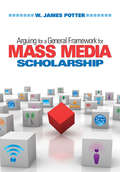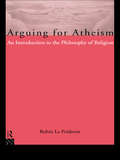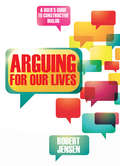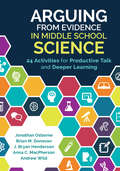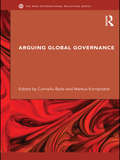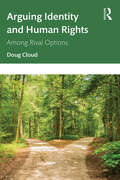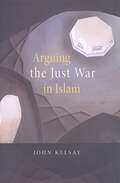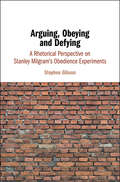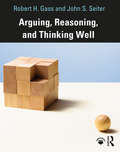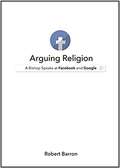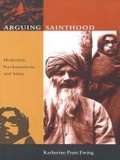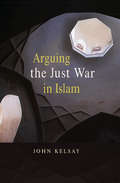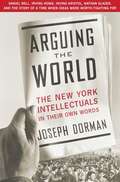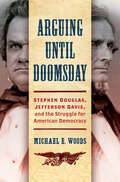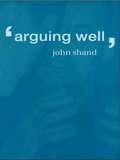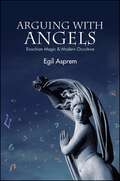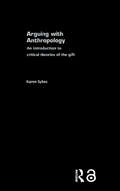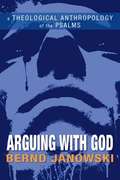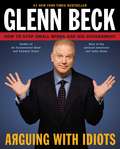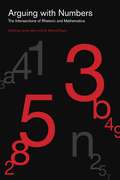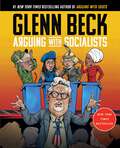- Table View
- List View
Arguing for a General Framework for Mass Media Scholarship
by Dr W. James Potter"Arguing for a General Framework for Mass Media Scholarship challenges scholars and students to consider and reconsider what we know about media and how we think about media. As such, the book provides an important framework for thinking about knowledge—regardless of the discipline… The text provides all of the necessary tools to move the field forward in a way that will increase the rigor of the work being done and augment the overall profile of the discipline." –Dana Mastro, University of Arizona In this groundbreaking book, W. James Potter presents an innovative perspective to media scholars and students who are frustrated with the fragmentation of research findings across so many journals, books, and fields. Arguing for a General Framework for Mass Media Scholarship presents a clear plan for a more efficient way to build knowledge about the mass media so that it can be better organized and made more useful. Key Features Conducts an in-depth analysis of mass media scholarship's four major facets of effects, content, audiences, and organizations Presents a significant shift in conceptualizing media effects and ways research can be conducted to generate more useful knowledge about media influence Develops "narrative line" as a tool to guide analyses about how content decisions are made by producersSynthesizes a system of explanation about why audiences attend to certain messages and how individuals construct meaning from those messagesIncorporates an analysis of mass media organizations to provide greater context of understanding messages and their effects on individuals and macro units in society"The book will play an important role in providing structure to a broad, fragmented discipline. I believe it will, at the very least, create important dialogues about what we now know/understand about areas of mass media, and where we should move as a discipline… This book is clearly a 'call to arms' for mass media scholars to ratchet up the quality of research (and what we know), to see the interconnections within and among strands of scholarship, and to move forward in a more efficient, organized manner. Professor Potter should be commended for this." —Roger Cooper, Ohio University "This book is...that call to action that comes forward every few years, to wake us up and challenge our ways of doing things, not by being radical, but via synthesis... I've been waiting for several years for a book like this." —Sahara Byrne, Cornell University
Arguing for Atheism: An Introduction to the Philosophy of Religion
by Robin Le PoidevinFirst Published in 2004. Routledge is an imprint of Taylor & Francis, an informa company.
Arguing for Our Lives
by Robert JensenWe live in a time when public discourse is more skewed than ever by the propaganda that big money can buy, with trust in the leadership of elected officials at an all-time low. The "news" has degenerated into sensationalist sound bites, and the idea of debate has become a polarized shouting match that precludes any meaningful discussion.It's also a time of anxiety, as we're faced with economic and ecological crises on a global scale, with stakes that seem higher than ever before. In times like these, it's essential that we be able to think and communicate clearly.In this lively primer on critical thinking, Robert Jensen attacks the problems head on and delivers an accessible and engaging book that explains how we can work collectively to enrich our intellectual lives. Drawing on more than two decades of classroom experience and community organizing, Jensen shares strategies on how to challenge "conventional wisdom" in order to courageously confront the crises of our times and offers a framework for channeling our fears and frustrations into productive analysis that can inform constructive action.Jensen connects abstract ideas with the everyday political and spiritual struggles of ordinary people. Free of either academic or political jargon, this book is for anyone struggling to understand our world and contribute to making it a better place.Robert Jensen is a professor in the School of Journalism at the University of Texas at Austin and a founding board member of the Third Coast Activist Resource Center.
Arguing From Evidence in Middle School Science: 24 Activities for Productive Talk and Deeper Learning
by Brian M. Donovan Anna C. MacPherson Andrew J. Wild Jonathan Francis Osborne J. (Joseph) HendersonTeaching your students to think like scientists starts here! If you’ve ever struggled to help students make scientific arguments from evidence, this practical, easy-to-use activity book is for you! Give your students the critical scientific practice today′s science standards require. You’ll discover strategies and activities to effectively engage students in arguments about competing data sets, opposing scientific ideas, applying evidence to support specific claims, and more. 24 ready-to-implement activities drawn from the physical sciences, life sciences, and earth and space sciences help teachers to: Align lessons to the Next Generation Science Standards (NGSS) Engage students in the 8 NGSS science and engineering practices Establish rich, productive classroom discourse Facilitate reading and writing strategies that align to the Common Core State Standards Extend and employ argumentation and modeling strategies Clarify the difference between argumentation and explanation Includes assessment guidance and extension activities. Learn to teach the rational side of science the fun way with this simple and straightforward guide!
Arguing From Evidence in Middle School Science: 24 Activities for Productive Talk and Deeper Learning
by Brian M. Donovan Anna C. MacPherson Andrew J. Wild Jonathan Francis Osborne J. (Joseph) HendersonTeaching your students to think like scientists starts here! If you’ve ever struggled to help students make scientific arguments from evidence, this practical, easy-to-use activity book is for you! Give your students the critical scientific practice today′s science standards require. You’ll discover strategies and activities to effectively engage students in arguments about competing data sets, opposing scientific ideas, applying evidence to support specific claims, and more. 24 ready-to-implement activities drawn from the physical sciences, life sciences, and earth and space sciences help teachers to: Align lessons to the Next Generation Science Standards (NGSS) Engage students in the 8 NGSS science and engineering practices Establish rich, productive classroom discourse Facilitate reading and writing strategies that align to the Common Core State Standards Extend and employ argumentation and modeling strategies Clarify the difference between argumentation and explanation Includes assessment guidance and extension activities. Learn to teach the rational side of science the fun way with this simple and straightforward guide!
Arguing Global Governance: Agency, Lifeworld and Shared Reasoning (New International Relations)
by Corneliu BjolaThis book deals with the questions of how global governance can and ought to effectively address serious global problems, such as financial instability, military conflicts, distributive injustice and increasing concerns of ecological disasters. Providing a unified theoretical framework, the contributors to this volume utilise argumentation research, broadening the concept by identifying the concerns about agency, lifeworld and shared reasoning that different strands of argumentation research have in common. Furthermore, they develop the concept of argumentative deontology in order to make sense of the processes through which argumentation comes to shape global governance. Empirically, the book demonstrates how ideas define actors’ interests, shape their interactions with each other, and ground intentions for collective action. Normatively, it provides an excellent theoretical platform for unveiling less visible manifestations of power in global politics and thereby improves our understandings of the ethical implications of global ordering. Addressing topical issues such as conflict and inter-civilizational dialogue, decision-making in international regimes and organizations, the World Social Forum, the Women’s Environment and Development Organization and Tobin Tax, this book will be of interest to students and scholars of argumentation theory, globalization and global governance
Arguing Identity and Human Rights: Among Rival Options
by Doug Cloud,Arguing Identity and Human Rights poses open questions about how to best argue for human rights, to help us think through the advantages and trade-offs of different rhetorical strategies, identify rival options, and, ultimately, choose our own paths. Modeling a humane approach to human rights argument, this book offers four deep rhetorical analyses of some of the most vexing and fascinating challenges facing human rights arguers in the United States: How do we want to frame difference in human rights advocacy—are we trying to downplay difference or something else? How can we best answer dismissive responses to human rights arguments? Should we portray people in marginalized categories as having “no choice” about their identity, and what would alternatives look like? What are the possibilities and perils of trying to “afflict” audiences with hegemonic identities to persuade them on human rights issues? Offering clear practical and theoretical implications while resisting easy answers, the book provides a concise introduction to the relationship between identity, discourse, and social change. Designed for both theorists and practitioners, for current and aspiring human rights arguers, this insightful text will be of use to students of rhetoric, argumentation, persuasion, and communication studies more generally, as well as human rights, social activism and social change, political science, sociology, and race and gender studies.
Arguing The Just War In Islam
by John Kelsay<P>Jihad, with its many terrifying associations, is a term widely used today, though its meaning is poorly grasped. Few people understand the circumstances requiring a jihad, or "holy" war, or how Islamic militants justify their violent actions within the framework of the religious tradition of Islam. <P>How Islam, with more than one billion followers, interprets jihad and establishes its precepts has become a critical issue for both the Muslim and the non-Muslim world.<P> John Kelsay's timely and important work focuses on jihad of the sword in Islamic thought, history, and culture.<P> Making use of original sources, Kelsay delves into the tradition of shari'a--Islamic jurisprudence and reasoning--and shows how it defines jihad as the Islamic analogue of the Western "just" war. <P>He traces the arguments of thinkers over the centuries who have debated the legitimacy of war through appeals to shari'a reasoning. <P>He brings us up to the present and demonstrates how contemporary Muslims across the political spectrum continue this quest for a realistic ethics of war within the Islamic tradition.<P> Arguing the Just War in Islam provides a systematic account of how Islam's central texts interpret jihad, guiding us through the historical precedents and Quranic sources upon which today's claims to doctrinal truth and legitimate authority are made.<P>In illuminating the broad spectrum of Islam's moral considerations of the just war, Kelsay helps Muslims and non-Muslims alike make sense of the possibilities for future war and peace.
Arguing, Obeying and Defying: A Rhetorical Perspective on Stanley Milgram's Obedience Experiments
by Stephen GibsonStanley Milgram's obedience experiments are among the most influential and controversial scientific studies ever conducted. The experiments are commonly understood to have shown how easily people can be led into harming another person, simply as a result of following orders. Recently, however, Milgram's studies have been subjected to a sustained critique and re-evaluation. This book draws on the vast stock of audio recordings from Milgram's experiments to reveal how these experiments can be understood as occasions for argumentation and rhetoric, rather than showing how passive subjects can be led into simply doing as they are told. In doing so, it reconsiders what we understand by 'obedience' and extends how social psychologists have understood rhetoric itself.
Arguing, Reasoning, and Thinking Well
by Robert Gass John SeiterArguing, Reasoning, and Thinking Well offers an engaging and accessible introduction to argumentation and critical thinking. With a pro-social focus, the volume encourages readers to value civility when engaged in arguing and reasoning. Authors Gass and Seiter, renowned for their friendly writing style, include real-world examples, hypothetical dialogues, and editorial cartoons to invite readers in. The text includes a full chapter devoted to the ethics of argument, as well as content on refutation and formal logic. It is designed for students in argumentation and critical thinking courses in communication, philosophy, and psychology departments, and is suitable for students and general education courses across the curriculum.
Arguing Religion: A Bishop Speaks at Facebook and Google
by Robert BarronEvery day, millions of people fight about religion. Whether with friends, family, or on social media, we expend lots of energy, lots of sharp words, and lots of strong feelings. But very few know how to have a good religious argument a rational, respectful, and productive exchange of differing views. <P><P> Bishop Robert Barron, one of the leading Catholic figures in the world and among the most active on social media, has enjoyed thousands of fruitful religious arguments. In this book based on talks delivered at Facebook and Google, he explains why religion at its best opens up the searching mind, and how we all believer and unbeliever alike can share better discussions about God.
Arguing Sainthood: Modernity, Psychoanalysis, and Islam
by Katherine Pratt EwingIn Arguing Sainthood, Katherine Pratt Ewing examines Sufi religious meanings and practices in Pakistan and their relation to the Westernizing influences of modernity and the shaping of the postcolonial self. Using both anthropological fieldwork and psychoanalytic theory to critically reinterpret theories of subjectivity, Ewing examines the production of identity in the context of a complex social field of conflicting ideologies and interests.Ewing critiques Eurocentric cultural theorists and Orientalist discourse while also taking issue with expatriate postcolonial thinkers Homi Bhabha and Gayatri Spivak. She challenges the notion of a monolithic Islamic modernity in order to explore the lived realities of individuals, particularly those of Pakistani saints and their followers. By examining the continuities between current Sufi practices and earlier popular practices in the Muslim world, Ewing identifies in the Sufi tradition a reflexive, critical consciousness that has usually been associated with the modern subject. Drawing on her training in clinical and theoretical psychoanalysis as well as her anthropological fieldwork in Lahore, Pakistan, Ewing argues for the value of Lacan in anthropology as she provides the basis for retheorizing postcolonial studies.
Arguing the Just War in Islam
by John KelsayJihad, with its many terrifying associations, is a term widely used today, though its meaning is poorly grasped. Few people understand the circumstances requiring a jihad, or "holy" war, or how Islamic militants justify their violent actions within the framework of the religious tradition of Islam. How Islam, with more than one billion followers, interprets jihad and establishes its precepts has become a critical issue for both the Muslim and the non-Muslim world. John Kelsay's timely and important work focuses on jihad of the sword in Islamic thought, history, and culture. Making use of original sources, Kelsay delves into the tradition of shari'a--Islamic jurisprudence and reasoning--and shows how it defines jihad as the Islamic analogue of the Western "just" war. He traces the arguments of thinkers over the centuries who have debated the legitimacy of war through appeals to shari'a reasoning. He brings us up to the present and demonstrates how contemporary Muslims across the political spectrum continue this quest for a realistic ethics of war within the Islamic tradition. Arguing the Just War in Islam provides a systematic account of how Islam's central texts interpret jihad, guiding us through the historical precedents and Qur'anic sources upon which today's claims to doctrinal truth and legitimate authority are made. In illuminating the broad spectrum of Islam's moral considerations of the just war, Kelsay helps Muslims and non-Muslims alike make sense of the possibilities for future war and peace.
Arguing the World
by Joseph DormanFrom cafeterias to cocktail parties to the pages of influential journals of opinion, few groups of friends have argued ideas so passionately and so publicly as the writers and critics known as the New York intellectuals. A brilliantly contentious circle of thinkers, they wielded enormous influence in the second half of the twentieth century through their championing of cultural modernism and their critique of Soviet totalitarianism. Arguing the World is a portrait of four of the leading members of the group in their own words, based on the extensive interviews that formed the basis for Joseph Dorman's acclaimed film of the same name, which New York magazine named in 1999 as the Best New York Documentary. The political essayist Irving Kristol, the literary critic Irving Howe, and the sociologists Daniel Bell and Nathan Glazer are brought into sharp focus in a vivid account of one of the century's great intellectual communities. In this wide-ranging oral history, Dorman documents the lifelong political arguments of these men, from their working-class beginnings to their rise to prominence in the years following World War II, particularly through their contributions to magazines and journals like Partisan Review and Com-mentary. From the advent of the Cold War and McCarthyism, to the rise of the New Left on college campuses in the sixties, to the emergence of neoconservatism in the seventies and eighties, the group's disagreements grew more heated and at times more personal. Driven apart by their responses to these historic events, in later life the four found themselves increasingly at odds with one another. Kristol became influential in America's resurgent conservative movement and Glazer made a name for himself as a forceful critic of liberal social policy, while Bell fought to defend a besieged liberalism. Until his death in 1993, Irving Howe remained an unapologetic voice of the radical left. Weaving personal reminiscences from these towering figures with those of their friends and foes, Arguing the World opens a new window on the social and intellectual history of twentieth-century America.
Arguing to Solve a Mystery
by Meghan Comstock Andrew Falk Emily Gibson Tessaly JenNIMAC-sourced textbook
Arguing until Doomsday: Stephen Douglas, Jefferson Davis, and the Struggle for American Democracy (Civil War America)
by Michael E. WoodsAs the sectional crisis gripped the United States, the rancor increasingly spread to the halls of Congress. Preston Brooks's frenzied assault on Charles Sumner was perhaps the most notorious evidence of the dangerous divide between proslavery Democrats and the new antislavery Republican Party. But as disunion loomed, rifts within the majority Democratic Party were every bit as consequential. And nowhere was the fracture more apparent than in the raging debates between Illinois's Stephen Douglas and Mississippi's Jefferson Davis. As leaders of the Democrats' northern and southern factions before the Civil War, their passionate conflict of words and ideas has been overshadowed by their opposition to Abraham Lincoln. But here, weaving together biography and political history, Michael E. Woods restores Davis and Douglas's fatefully entwined lives and careers to the center of the Civil War era. Operating on personal, partisan, and national levels, Woods traces the deep roots of Democrats' internal strife, with fault lines drawn around fundamental questions of property rights and majority rule. Neither belief in white supremacy nor expansionist zeal could reconcile Douglas and Davis's factions as their constituents formed their own lines in the proverbial soil of westward expansion. The first major reinterpretation of the Democratic Party's internal schism in more than a generation, Arguing until Doomsday shows how two leading antebellum politicians ultimately shattered their party and hastened the coming of the Civil War.
Arguing Well
by John ShandArguing Well is a lucid introduction to the nature of good reasoning, how to test and construct successful arguments. It assumes no prior knowledge of logic or philosophy. The book includes an introduction to basic symbolic logic. Arguing Well introduces and explains: * The nature and importance of arguments * What to look for in deciding whether arguments succeed or fail * How to construct good arguments * How to make it more certain that we reason when we should The book is ideal for any student embarking on academic study where presenting arguments are what matters most; in fact, for all people who want to understand the nature and importance of good reasoning and awaken their ability to argue well.
Arguing with Angels: Enochian Magic and Modern Occulture (SUNY series in Western Esoteric Traditions)
by Egil AspremThis fascinating work explores John Dee's Enochian magic and the history of its reception. Dee (1527–1608/9), an accomplished natural philosopher and member of Queen Elizabeth I's court, was also an esoteric researcher whose diaries detail years of conversations with angels achieved with the aid of crystal-gazer Edward Kelley. His Enochian magic offers a method for contacting angels and demons based on secrets found in the apocryphal Book of Enoch.Examining this magical system from its Renaissance origins to present day occultism, Egil Asprem shows how the reception of Dee's magic is replete with struggles to construct and negotiate authoritative interpretational frameworks for doing magic. Arguing with Angels offers a novel, nuanced approach to questions about how ritual magic has survived the advent of modernity and demonstrates the ways in which modern culture has recreated magical discourse.
Arguing With Anthropology: An Introduction to Critical Theories of the Gift
by Karen SykesArguing with Anthropology is a fresh and wholly original guide to key elements in anthropology, which teaches the ability to think, write and argue critically. Using the classic 'question of the gift' as a master-issue for discussion, and drawing on a rich variety of Pacific and global ethnography, it provides a unique course in methods, aims, knowledge, and understanding. The book's highly original hypothetical approach takes gift-theory - the science of obligation and reciprocity - as the paradigm for a virtual enquiry which explores how the anthropological discipline has evolved historically, how it is applied in practice and how it can be argued with critically. By asking students to participate in projected situations and dilemmas, and in arguments about the form and nature of enquiry, it offers working practice of dealing with the obstacles and choices involved in anthropological study. * From an expert teacher whose methods are tried and tested* Comprehensive and fun course ideal for intermediate-level students* Clearly defines the functions of anthropology, and its key theories and arguments* Effectively teaches core study skills for exam success and progressive learning.
Arguing with God
by Bernd JanowskiThis is the first English translation of Bernd Janowski's incisive anthropological study of the Psalms, originally published in German in 2003 as Konfliktgespräche mit Gott. Eine Anthropologie der Psalmen (Neukirchener). Janowski begins with an introduction to Old Testament anthropology, concentrating on themes of being forsaken by God, enmity, legal difficulties, and sickness. Each chapter defines a problem and considers it in relation to anthropological insights from related fields of study and a thematically relevant example from the Psalms, including how a central aspect of this Psalm is explored in other Old Testament or Ancient Near Eastern texts. Each chapter concludes with an "Anthropological Keyword," which explores especially important words and phrases in the Psalms. The book also includes reflections on reading the Psalms from a New Testament perspective, focusing on themes of transience, praising God, salvation from death, and trust in God. Janowski's study demonstrates how the Psalms have important theological implications and ultimately help us to understand what it means to be human.
Arguing with Idiots
by Kevin Balfe Glenn BeckFUNNY. FRIGHTENING. TRUE. The #1 New York Times bestseller that gives you the right answers when idiots leave you speechless! It happens to all of us: You're minding your own business, when some idiot* informs you that guns are evil, the Prius will save the planet, or the rich have to finally start paying their fair share of taxes. Just go away! you think to yourself--but they only get more obnoxious. Your heart rate quickens. You start to sweat. But never fear, for Glenn Beck has stumbled upon the secret formula to winning arguments against people with big mouths and small minds: knowing the facts. And this book is full of them. The next time your Idiot Friends tell you how gun control prevents gun violence, you'll tell them all about England's handgun ban (see page 53). When they insist that we should copy the UK's health-care system, you'll recount the horrifying facts you read on page 244. And the next time you hear how produce prices will skyrocket without illegal workers, you'll have the perfect rebuttal (from page 139). Armed with the ultimate weapon--the truth--you can now tolerate (and who knows, maybe even enjoy?) your encounters with idiots everywhere! *Idiots can't be identified through voting records; look instead for people who hide behind stereotypes, embrace partisanship, and believe that bumper sticker slogans are a substitute for common sense.
Arguing with Numbers: The Intersections of Rhetoric and Mathematics (RSA Series in Transdisciplinary Rhetoric #16)
by James Wynn G. Mitchell ReyesAs discrete fields of inquiry, rhetoric and mathematics have long been considered antithetical to each other. That is, if mathematics explains or describes the phenomena it studies with certainty, persuasion is not needed. This volume calls into question the view that mathematics is free of rhetoric. Through nine studies of the intersections between these two disciplines, Arguing with Numbers shows that mathematics is in fact deeply rhetorical. Using rhetoric as a lens to analyze mathematically based arguments in public policy, political and economic theory, and even literature, the essays in this volume reveal how mathematics influences the values and beliefs with which we assess the world and make decisions and how our worldviews influence the kinds of mathematical instruments we construct and accept. In addition, contributors examine how concepts of rhetoric—such as analogy and visuality—have been employed in mathematical and scientific reasoning, including in the theorems of mathematical physicists and the geometrical diagramming of natural scientists. Challenging academic orthodoxy, these scholars reject a math-equals-truth reduction in favor of a more constructivist theory of mathematics as dynamic, evolving, and powerfully persuasive. By bringing these disparate lines of inquiry into conversation with one another, Arguing with Numbers provides inspiration to students, established scholars, and anyone inside or outside rhetorical studies who might be interested in exploring the intersections between the two disciplines.In addition to the editors, the contributors to this volume are Catherine Chaput, Crystal Broch Colombini, Nathan Crick, Michael Dreher, Jeanne Fahnestock, Andrew C. Jones, Joseph Little, and Edward Schiappa.
Arguing with Numbers: The Intersections of Rhetoric and Mathematics (RSA Series in Transdisciplinary Rhetoric)
by James Wynn G. Mitchell ReyesAs discrete fields of inquiry, rhetoric and mathematics have long been considered antithetical to each other. That is, if mathematics explains or describes the phenomena it studies with certainty, persuasion is not needed. This volume calls into question the view that mathematics is free of rhetoric. Through nine studies of the intersections between these two disciplines, Arguing with Numbers shows that mathematics is in fact deeply rhetorical. Using rhetoric as a lens to analyze mathematically based arguments in public policy, political and economic theory, and even literature, the essays in this volume reveal how mathematics influences the values and beliefs with which we assess the world and make decisions and how our worldviews influence the kinds of mathematical instruments we construct and accept. In addition, contributors examine how concepts of rhetoric—such as analogy and visuality—have been employed in mathematical and scientific reasoning, including in the theorems of mathematical physicists and the geometrical diagramming of natural scientists. Challenging academic orthodoxy, these scholars reject a math-equals-truth reduction in favor of a more constructivist theory of mathematics as dynamic, evolving, and powerfully persuasive. By bringing these disparate lines of inquiry into conversation with one another, Arguing with Numbers provides inspiration to students, established scholars, and anyone inside or outside rhetorical studies who might be interested in exploring the intersections between the two disciplines.In addition to the editors, the contributors to this volume are Catherine Chaput, Crystal Broch Colombini, Nathan Crick, Michael Dreher, Jeanne Fahnestock, Andrew C. Jones, Joseph Little, and Edward Schiappa.
Arguing With People
by Michael A. GilbertArguing with People brings developments from the field of Argumentation Theory to bear on critical thinking in a clear and accessible way. This book expands the critical thinking toolkit, and shows how those tools can be applied in the hurly-burly of everyday arguing. Gilbert emphasizes the importance of understanding real arguments, understanding just who you are arguing with, and knowing how to use that information for successful argumentation. Interesting examples and partner exercises are provided to demonstrate tangible ways in which the book's lessons can be applied.
Arguing with Socialists
by Glenn BeckIn Arguing With Socialists, New York Times bestselling author Glenn Beck arms readers to the teeth with information necessary to debunk the socialist arguments that have once again become popular, and proves that the free market is the only way to go. <P><P> With his trademark humor, Beck lampoons the resurgence of this bankrupt leftist philosophy with thousands of stories, facts, arguments and easy-to-understand graphics for anyone who is willing to ask the hard questions. He shows that this new shiny socialism is just the same as the old one: a costly and dangerous failure that leaves desperation, poverty, and bodies in its wake. <P><P><b>A New York Times Bestseller</b>
